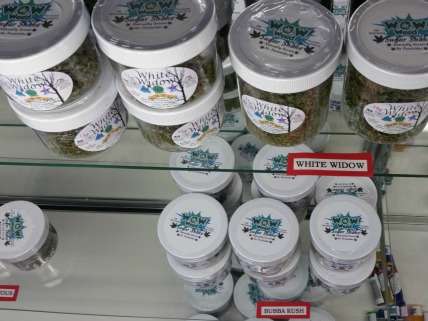Washington's Marijuana Regulators Give Up Cap on Pot Stores
Central planning of the cannabis market did not quite work as intended.

When it began implementing I-502, Washington's marijuana legalization initiative, in 2013, the state Liquor Control Board, now known as the Liquor and Cannabis Board (LCB), planned to issue a total of 334 retail licenses for the entire state. That's about five marijuana stores for every 100,000 residents. By comparison, Colorado, the other state where voters approved legalization in 2012, has 380 recreational outlets, or seven per 100,000 residents, and the marijuana initiative rejected by Ohio voters last week would have authorized 10 pot shops per 100,000 people. But the LCB's relatively low cap on the number of outlets, which led to license lotteries in many cities, never really kicked in, and the board has officially abandoned it.

As of last week, the LCB had managed to license just 212 retailers, of which 188 were open for business. Now that it is accepting license applications from medical dispensaries seeking to serve recreational consumers, any notion of numerical limits has gone by the boards. The new applications were triggered by a 2015 law that aims to integrate heretofore unregulated medical suppliers with the state-licensed stores authorized by I-502. "Gone are the quotas and lotteries used in the first round of licensing," notes KUOW, the NPR station in Seattle. "Now there are no limits on the number of licenses that may be granted—a change that took some cities by surprise."
Cities can still impose their own numerical limits. KUOW reports that Renton, a Seattle suburb with a population of about 100,000, has tentatively settled on a ceiling of five—"two more than the city was assigned under the initial quotas in I-502." In practice, the number of outlets in any city may also be limited by rules that require them to be at least 1,000 feet from elementary or secondary schools, playgrounds, recreation centers, child care centers, parks, public transit centers, libraries, and game arcades open to minors.
The LCB may yet revive the cap on retailers as part of its efforts to prevent diversion of marijuana to other states. "An upcoming report from the RAND Corporation…will estimate how much marijuana Washington residents are consuming," KUOW says. "Those numbers will help guide his agency's decision on how many licenses to grant." An LCB spokesman says that "while there is presently no cap, we have also been very upfront about the fact that we may shut it off."
The LCB also has tried to limit production of marijuana by assigning licensed growers shares of a statewide quota designed to prevent diversion. That quota was based on a highly uncertain estimate of total cannabis consumption and a projection that newly legal marijuana merchants would initially capture 25 percent of that market. Last July, a year after legal recreational sales began, LCB Deputy Director Randy Simmons estimated that licensed retailers were serving about 10 percent of the market.
[Thanks to Marc Sandhaus for the tip.]


Show Comments (38)